Kickstarter: Setting it Up – Time and Money
I have run six Kickstarters for my brand Kimchi Kawaii, four which successfully funded beyond the goal, one that didn’t fund and one currently running. I get a lot of questions about running Kickstarters and while I don’t claim to be the foremost guru of crowd funding (I have yet to hit that magic formula where I fully fund in a few hours), I figured I would start a little four part series compiling what I’ve learned through trial and error. Part One gives food for thought when planning your project.
You’ve got your ideal time to run your Kickstarter crowd funding campaign so now it’s time to get set up and put your creation out in the wide world! I said it earlier and will say it again – Kickstarters can be rough rides, but having a successful one can make it all worth it. Hopefully, you can find some tips in the following paragraphs to bring you closer to your goal.
Make sure it adds up
One of the first things you’ll need to do is set your funding goal. Depending on your product, that number can start to look very scary, very fast. You may be tempted to set it just for the amount needed for the product or set it even lower to make it look more obtainable to backers. Resist! It’s better to not fund than to fund and suddenly find your goal isn’t sufficient to fulfill all the backer rewards which you will be legally bound to deliver with a successful campaign.
Kickstarter and their payment processor (currently Stripe), will take out a fee for their services. Expect to give about 10% of your funding to this. 10% may not seem like a huge number, but when you’re looking at a campaign in the thousands, this adds up to a chunk of change pretty quickly.
Funds raised are also considered taxable income by the government. You may plan on just covering taxes on your own later in the year, but if not, make sure you factor this into your number as well.
Make sure to set yourself a little padding for any shipping mishaps which are almost unavoidable – packages go missing, packages turn out more expensive than planned, etc. As I do plush which have about a two month production time that doesn’t include the months of planning and the actual campaign, I’ve actually had postal rates change between when I set my shipping and when I actually ship.
Something I want to point out that I learned the hard way – plan for dropped pledges and include a buffer in your funding goal. Kickstarter bases the success of a campaign off pledges. No money is collected until after the deadline you set and you reach your funding. Every campaign I’ve had has had pledges that failed to collect for whatever reason. Through messaging my backers and phrasing it that I don’t want them to miss out on their rewards (be very careful to not come off as accusatory, a lot are just honest mistakes), I’ve been able to keep failed pledges to a minimum, but there are still some that I can’t get a hold of.
No matter what the reason is for these failed pledges, it still doesn’t change the fact that at your deadline, you had the right number to be considered fully funded. Per Kickstarter’s terms, you are legally bound to deliver what you promised to your paying backers – even if the actual amount collected comes to less than your funding goal.
Here’s an example: You want to create a plush and it costs $8,500 to produce. You factor in the 10% and set your goal at $9,350. You reach full funding by your deadline which is awesome, but 6 large pledges fail to collect, totaling $600. After Kickstarter takes out their fees, you’re left with $7,875. You need to come up with $625 on your own to fill in that hole to order the product promised to your backers. When you’re operating on a tight budget and a timeline, that can be financially devastating.
Under promise, over deliver
When setting your estimated time of arrival to your backers, it’s always better to set the time further out and deliver ahead of schedule. This can also help prevent a mad shipping scramble and cover you for any shipping delays as let’s face it, putting packages in the postal service can be an adventure in itself!
Get ship shape!
There’s really no way to get a 100% accurate shipping cost for your backer packages. Postage rates could increase or if you’re doing an add-on shop in your campaign, package weights can fluctuate. Sometimes, it really does feel like trying to hit a moving target.
Consider buying a postal scale. If you are able to get actual prototypes before launching, you can weigh it with your intended packaging to get pretty close estimates. Kickstarter allows you to set up shipping by location which is pretty handy.
- Domestic – I pick the state the furthest from me and run my cost based off that. For me, it’s somewhere on the east coast. You can’t set shipping by specific states, but your rates are not going to change much, if any. Be warned, Priority Mail can get a bit pricey though the further your package has to go. I try to keep everything to First Class, but sometimes, it’s just unavoidable (and that’s why you put in some padding on the funding).
- International – The rates I figure out and list are Canada, Europe (Great Britain, Germany, etc. are all very close in cost) and Everywhere Else. I found that shipping to Australia wasn’t too different from the cost to ship to Asia, so I lump those into this last category on Kickstarter.
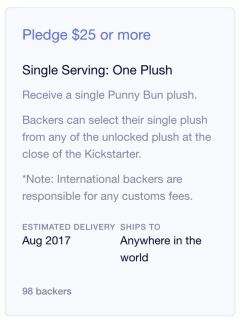
Example of backer tier with customs fees disclaimer.
Make sure to put in your Kickstarter a note about customs fees and taxes being the responsibility of the backer for international packages. Each country can have different policies and fees which are impossible to keep up with. Some packages will get through without any fees at all, but it’s best to put this out there as fair warning to backers. I put it in the main body of my content AND in each tier so the backers can see it when they are making their selection.
Another reason to get a postal scale – everyone at the post office will love you for pre-printing your shipping labels instead of going to the counter and purchasing postage for 100 different weight packages at the counter.
Keep it simple!
Try to keep your tiers simple and straight forward. This will help backers make a decision faster on what level to back. Consider making a quick view chart as an image in the main body of your content. Here is an example of one I did for my Purrista Pawfee 2 campaign: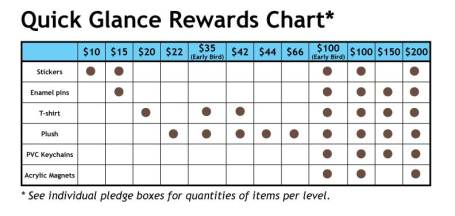 It’s easy for a backer to see all tiers and rewards at a glance and avoid having to scroll up and down a lot, comparing each tier in their boxes as listed on Kickstarter.
It’s easy for a backer to see all tiers and rewards at a glance and avoid having to scroll up and down a lot, comparing each tier in their boxes as listed on Kickstarter.
Another reason to keep your tiers simple? Your sanity! If you are fulfilling your rewards on your own and have 100+ packages, keeping the tiers simple and limited will mean less chances for mistakes when putting all the packages together.
____
Kickstarters really do require a lot of time and thought to have a chance at success. This post mainly touches on the financial planning of a project. What I’ve put in here is what has worked for me and I know each project will have it’s unique challenges, but hopefully, this can help you get going in the right direction your own.
Next up: Setting Up (Part 2b) – Make it Shine!
Kickstarters: Kicking it Off
I have run six Kickstarters for my brand Kimchi Kawaii, four which successfully funded beyond the goal, one that didn’t fund and one currently running. I get a lot of questions about running Kickstarters and while I don’t claim to be the foremost guru of crowd funding (I have yet to hit that magic formula where I fully fund in a few hours), I figured I would start a little four part series compiling what I’ve learned through trial and error.
There are many different sites to chose from out there – some are all or nothing, some let you keep whatever money you’ve raised, even if you haven’t hit your goal. There’s really no right or wrong. It’s really what works for your needs. That part I leave up to you. In the meantime, here are some things to think about as you’re getting ready for your adventure.
Believe in your product.
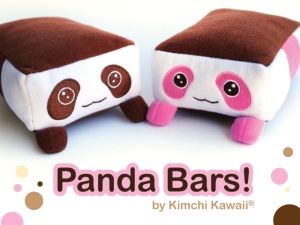
The super cute and kawaii chocolate and strawberry panda bar plushies!
This may sound like a ‘duh’ moment, but it can be something that people overlook in the excited rush to launch. The very first Kickstarter I did was for some panda ice cream sandwich plush. I was new to the plush outsourcing game and basically, I let the factory tell me what my plush should look like. I didn’t push back enough with edits until it was in line with MY design. So when I got the prototypes, I had some doubts about them.
You may think it won’t affect your project, but if you’re not behind it 200 percent, it will show. Kickstarters require a ton of marketing to get the word out and the pledges in. You need every advantage you can get. It was really hard to talk to people and get excited about it when I was feeling half hearted about the prototypes. I was trying to get people to believe enough in my product to pledge their hard earned money even though I didn’t fully believe in it. I felt like I was being dishonest in selling them on this. The Kickstarter failed to fund.
Time Commitment
Crowd funding done well takes A LOT of time. You can expect to spend anywhere from 4 months to a year on a project from prototyping to the time you send out the last backer package. I start planning financial details and backer levels a few months before start date (for first time creators, you may want to start even earlier). About a month out, I start marketing a lot more through my social media and physical cards sent with customers’ online orders. (I’ll talk more about promotion in a later post). I also have the graphics to put together for my website, the project page and my social media promotions.
Then, it’s launch and time to hit the most intense part of the project. The average recommended time is 30-60 days. Longer than that and it’s really hard to keep people engaged. You need to be able to keep the pledges coming in through creative social media strategies. Additionally, as this is a dynamic platform, you also need to think fast. You may have plan A and B, but then depending on how pledging is going, have to suddenly switch to plan C. I often try to clear my project queue as much as possible for the time my Kickstarter is live so I can give it my undivided attention and energy.
I often laugh a bit when the last day hits and then people say ‘Now you can relax’. Nope, now I have ordering, backer surveys and then packaging and shipping. Depending on how large your project turns out, you may want to consider an outside service for this part like Backer Kit. Just keep in mind that these services often have additional fees to budget for. As of posting, I haven’t had a Kickstarter large enough to warrant using one, but I do have some friends who have and they’ve said these sites are lifesavers.
Consider the time of year.
There are many posts out there suggesting the best times to run a project. I’m going to share when I’ve discovered NOT to run a project.
One of mine, I made the mistake of running right over tax day, April 15th. All of a sudden, people who had waited last minute to do their taxes discovered that they were not getting that nice refund from Uncle Sam and started looking closer at their bank balances. I had a ton of pledges drop the few days around that date. So much so that I actually posted a negative total for some of those days. I don’t know about other platforms, but Kickstarter shows a progress chart. Mine actually dipped around the 15th. It did eventually fund, but that one stretch was not a good feeling!
Try to avoid setting an estimated time of arrival (ETA) anywhere near the holidays. Even if you state it in your project over and over, there will be backers who won’t see it and expect that the product will be there in time to put under the Christmas tree. If it doesn’t arrive, cue the angry or panicked emails about Christmas being a failure.
Another thing to think about, when the items do arrive, what will be going on in YOUR life? Will you be trying to ship during what is normally a busy time of year for you? I sell at a lot of anime conventions. Con season is nearly year round now, but heavily concentrated during the summer months. So I try to avoid having Kickstarter shipping (which is a huge project in itself) during that time as I’m also hand creating product in addition to my full time job.
I did find that due to scheduling and the plans for my business this year that I couldn’t avoid the delivery time falling in the middle of con season with my current project. So I’ve adjusted the ETA to backers to allow for the fact that I’ll be juggling multiple tasks when stuff arrives.
*Side note to those doing plush projects: Factories in China shut down for about a month around Chinese New Year. Make sure you account for this in either your preparations or the backer ETA you’re listing in your project.
Back up plans are always good, right?
Not always. As tempting as it may be, don’t bail out your own Kickstarter. With all or nothing platforms like Kickstarter it’s almost a risk free way to test a product’s appeal among your customer base. It can be extremely hard to put something out there that you believe in and watch it fail. As hard as it is, it may be that it just doesn’t have the pull to make it a successful product in the long run.

Sweet Dreams Kickstarter is 86% funded as of posting!
My second Kickstarter was for a sleeping chocolate covered strawberry plush. Pledging was going very slowly and I didn’t want another failure so I threw in $2,000 of my own money to push it to full funding. I now have 400 or so strawberry plush taking up space. They move just as slowly in my shop and at cons as they did on the Kickstarter. I should have seen it as a sign that this was not a product with strong interest and just swallowed my pride and let it go.
__
So, hopefully this gives you some food for thought when planning your crowd funding project. I’ll be honest, it can be a crazy, emotional roller coaster and at times, you may wonder why you’re torturing yourself with all the anxiety that can come from them. These things are hard work! But if you do stick it through, it’s an amazing feeling when you hit your funding goal and realize that enough people believed enough in your product to put their money behind it!
Next up: Setting it Up
Put on Your Sales Face
Since there aren’t flashing signs over our heads that say our personality types, we really need to be careful of the front we present to the public when representing our brands. Joe Schmo who doesn’t know me at all may not give me the mercy of the introvert card. They may just think I’m rude or disinterested.
Continue Reading February 25, 2017 at 6:48 pm Leave a comment
Purrista Pawfee Kickstarter: Final 48 Hours!
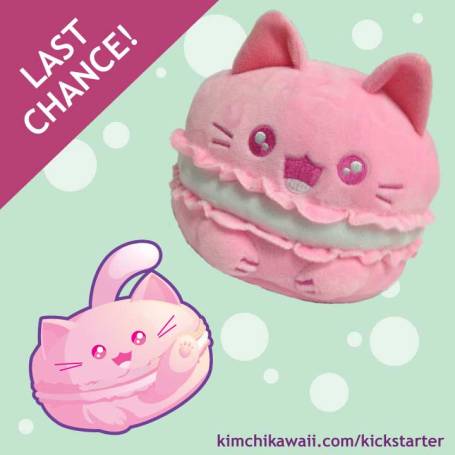 Whew, it’s hard to believe we’re on the final 48 hours here of the Purrista Pawfee Kickstarter! It’s been quite a ride and I think the most nail biting parts are still ahead. We managed to fully fund Catpuccino in 9 days. The Danish Pawstry came soon after. The last one we hope to fund is the Mewcaron, a cute macaroon hybrid kitty. As of posting, Mewcaron is just a tad over $2k needed for full funding.
Whew, it’s hard to believe we’re on the final 48 hours here of the Purrista Pawfee Kickstarter! It’s been quite a ride and I think the most nail biting parts are still ahead. We managed to fully fund Catpuccino in 9 days. The Danish Pawstry came soon after. The last one we hope to fund is the Mewcaron, a cute macaroon hybrid kitty. As of posting, Mewcaron is just a tad over $2k needed for full funding.
Remember, I need full funding for each plush that goes into production! I know some said they are waiting til Mewcaron unlocks, but if too many wait too long, it won’t happen.
Please help by either pledging and/or sharing about this Kickstarter!
Purrista Pawfee will close Monday, January 25, 2016 at 9pm PST.
Purrista Pawfee: Coffee Cat Kickstarter

Just a quick entry here to let you know that I’ve launched my next Kickstarter. This one is to fund the cats of Purrista Pawfee. The star of the show is Catpuccino – a kitty and coffee shaped plush. Once again, I’ve got stretch goals lined up that continue the theme. Danish Pawstry, Mewcaron, Biskitti and DeCat are all waiting in the wings.
I’m hoping to get these plush funded and delivered here in time for me to sell them at CatConLA – an amazing convention all about, you guessed it, cats. I had an awesome time last year and am already paid up for a spot again to sell in the artist’s village this year.
As I need to get the plush order in before Chinese New Year shuts down the factory for February, I’m only running this Kickstarter for 21 days total. Final day is Monday, January 25, 2016. As of writing this, I’m getting close to 50% funded for Catpuccino and it’s only day 2!
Even if you can’t pledge at this time, please help spread the word to any friends you have who love cute, cats, coffee or all three!
Thank you!
Plush Manufacture: How Do I Fund All This?
This is the third and last of a series of blogs regarding the plush process. Part 1 is about choosing to manufacture. Part 2 is about choosing to go direct to factory or to use a middle man.
You’ve considered the pros and cons of getting your plush manufactured. You’ve done the research and decided to go either direct to factory or go through an established middle man. So now, you have all the numbers to bring your creation to life and Holy weeping bank account, Batman!
Yep, the average plush can set you back a minimum of $4,000! And that price is just a rough estimate. Cost depends on size, complexity, factory chosen, shipping method and where they need to ultimately be delivered to. Since most of us are small business owners, we usually don’t have thousands of dollars just laying around. In order to fund plush, many turn to one of two methods – pre-order events or crowdfunding.
Pre-Order Events
Pre-order events I find can be a bit risky if you don’t have a large, active following. If you’re totally reliant on X amount being sold before you can afford to place the order, there’s really no telling how long it will take to get there. It could be anywhere from 1 week to 7 months or so to meet the goal amount. This means it’s equally ambiguous setting an estimated delivery date since nothing starts until the payment has been made to the factory.
When people are paying for a future product, it’s a much easier sell if you have a more firm deadline set ahead of the time. Granted, timelines can flux when dealing with all the moving parts involved in overseas manufacture, but having a date (and keeping your customers updated about it) is a good way to give them confidence that you intend to deliver a product.
Additionally, communicating updates can be a bit rough. Facebook and other social media can be a bit sketchy in message delivery due to their alogrithms. You can create an email list and/or newsletter for updating, but sometimes they can get lost in spam filters. You can update your website, but traffic may be slow there. And let’s face it, you can (and should) update all methods of communication, but that’s a lot to keep track of.
Crowdfunding
The other option is crowdfunding through a website like Kickstarter or Indigogo. In a nutshell, you post a project that will cost X amount to produce. You offer different levels for people to pledge at with specific rewards attached, often including the product to be funded. You set a deadline (average is 30 days for a campaign) and if your amount has been made by the last day, your backers are charged and you get the money to make the product. If you reach the last day without meeting your goal, you may get whatever was collected during the campaign or nothing at all. Kickstarter is an all or nothing deal. Either way, you may be short of your funding goal and unable to produce the plush.
These sites have rules that hold the creators accountable to their backers. They must deliver the promised product to their backers if fully funded. This can help backers feel more confident when putting down money on a future product. So realize that if you decide to go with one that isn’t all or nothing, you are still on the hook to produce a product to your backers and you are on the hook to make up the missing difference in funding. It can be a bit nail biting to have something so final as ‘all or nothing’ with Kickstarter, but it feels safer to me since I can’t be stuck to make up $$ on my own to complete a project.
Additionally, you’re hooking up your little boat to a big ship. These sites have whole departments devoted to search engine optimization (SEO) and an established global name. Their reach is global! They want your project to succeed just as much as you do since they get a percentage for hosting your project. So while you definitely need to be promoting your project religiously, you do have the added bonus of using a well known website.
A side bonus to running a crowd funding campaign is that it’s a fantastic marketing opportunity for your brand. If you’re doing your due diligence with marketing it, you can reach a whole different audience that you may not reach through going it alone and running a pre-order. I know for Kimchi Kawaii, I’ve had people comment that they found me through my various Kickstarters.
Hopefully, you’ve found some tips and had some questions answered about plush production. I’m not going to lie, it’s a lot of work and those huge dollar signs can be scary for sure. But, if you have a strong design that you’ve tested already among your market, it can really be the key to take your business to the next level. Just make sure you have plenty of storage available for all those plush!
Professional Plush Manufacture: Direct to Factory or Middleman?
You’ve thought about all the realities of getting a plush manufactured and are ready to make the investment. Now to choose the method of getting your creation brought to life.
Professional Plush Manufacture: Factory or Handcraft?
You’ve got a plush design that you like and it’s selling so fast you can’t keep up. Outsourcing your plush is looking like the solution to all your problems.
Continue Reading October 21, 2015 at 5:03 am Leave a comment
Otakon 2015: Artist Alley Review
This was my second year at Otakon and things got off to a rough start and I didn’t make goal, but I survived. I kind of have mixed feelings about this weekend. At least my flight got me there without a hitch like what happened with Anime Boston!
A highlight of the weekend was that I got to meet a lot of artists I correspond with online in the Facebook artist alley group. I also got to finally meet Tonya from Shinedown Productions who’s been doing my Punny Buns plush. She brought me the final Hamburger Bun prototype on Saturday. I had Hammy out for display at my table and got a lot of positive reaction to him. Honey Bun didn’t make it to this con due to luggage space. I was able to get some pre-orders for him. I’m excited for 2016 when I have the Punny Buns with me for the con season. I think this will really help me get to the next level with Kimchi Kawaii.
I had planned on bringing over 100 plush, but due to the fast turnover time between Anime Expo and this one, I didn’t complete as many as I would have liked. I did rush through a bunch so I could send them ahead of me. Plush sell well, but boy are they bulky. Shipping has now become a part of my artist alley prep. I guess it keeps me on track, especially for east coast cons since I have to factor in cross country shipping time.
Sales seemed slower this year on the first day compared to the previous year and general sales all weekend seemed lower for everyone I spoke to in the AA. This year, Otakon only saw about 28,000 which was a significant drop in attendance. I think there were two main factors in this – they did away with one day passes so that meant someone who wanted to just come on say, Saturday, still had to pay around $100 for registration. Also, even though it was months ago, the riots in Baltimore seemed to keep some people away as well.
I had hoped that with the increased plush variety, I would make a certain sales goal, but I came in well short of it. Honestly, it was a bit disappointing with all the work and headache I had leading up to this con – extreme time crunches, other obligations cutting into prep time, wrong items being shipped, items missing all together from orders, etc. This is the last travel con for my 2015 season and I’m pretty happy to be putting the suitcases away until next year. I’ll have the Punny Buns arriving from the Kickstarter so will be focusing on that and getting ready for my dealers booth at SacAnime on Labor Day weekend.
My plush did sell out and this was the first con where I actually sold out of the Sweet Dreams Strawberries by the second day. Usually, those are a hard sell – lots of people think they’re super cute, but they just won’t buy. However, the prints were slow to move and I had a hard time selling the deco den phone cases that I carry.
Even before this con, I’ve decided to discontinue them as it’s just too difficult to keep up with the new models coming out every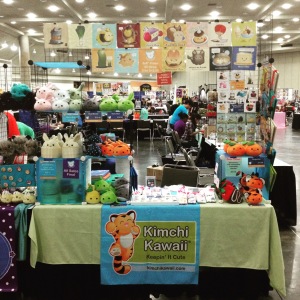 year. Plush making is also taking up a significant chunk of my time. Additionally, the market is just getting flooded and a lot of people are underpricing their cases which means I can’t compete. Side note to artists: PLEASE don’t undervalue your work! It just hurts you and your fellow artists and gives the buying public the expectation that they shouldn’t pay more than $5 for anything we do (ends soapbox).
year. Plush making is also taking up a significant chunk of my time. Additionally, the market is just getting flooded and a lot of people are underpricing their cases which means I can’t compete. Side note to artists: PLEASE don’t undervalue your work! It just hurts you and your fellow artists and gives the buying public the expectation that they shouldn’t pay more than $5 for anything we do (ends soapbox).
So to sum it all up – for those of you considering selling at this con, it has had the potential for good sales, but this year was just an off year for whatever reason. It will be interesting to see if they lower prices or bring back the one day pass again for next year which could up sales again. They will also be moving to the D.C. area for 2017.
Also know that Otakon has some of the longest artist alley hours out there. Friday was from 1pm – 11pm. Saturday was from 10am – 11pm. Sunday is more normal in hours. If you can swing it, I definitely recommend bringing a helper to give you breaks or make sure you are neighbors with friends!
Artist Alley Review: CatConLA 2015
This past weekend, I sold at the very first CatCon LA. This was billed as ‘Comic-Con for cat lovers’. It was such an amazing weekend and exceeded my expectations by far.

